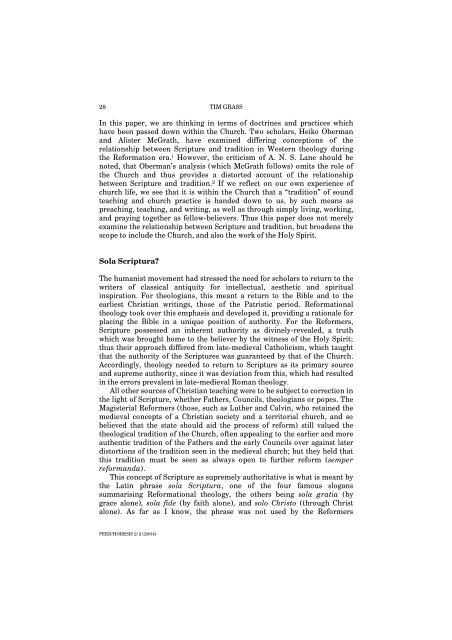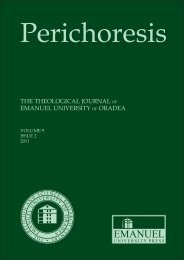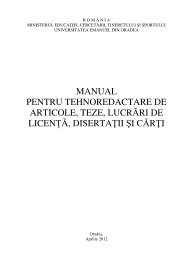Paradise Lost - Universitatea "Emanuel"
Paradise Lost - Universitatea "Emanuel"
Paradise Lost - Universitatea "Emanuel"
Create successful ePaper yourself
Turn your PDF publications into a flip-book with our unique Google optimized e-Paper software.
28<br />
PERICHORESIS 2/2 (2004)<br />
TIM GRASS<br />
In this paper, we are thinking in terms of doctrines and practices which<br />
have been passed down within the Church. Two scholars, Heiko Oberman<br />
and Alister McGrath, have examined differing conceptions of the<br />
relationship between Scripture and tradition in Western theology during<br />
the Reformation era. 1 However, the criticism of A. N. S. Lane should be<br />
noted, that Oberman’s analysis (which McGrath follows) omits the role of<br />
the Church and thus provides a distorted account of the relationship<br />
between Scripture and tradition. 2 If we reflect on our own experience of<br />
church life, we see that it is within the Church that a “tradition” of sound<br />
teaching and church practice is handed down to us, by such means as<br />
preaching, teaching, and writing, as well as through simply living, working,<br />
and praying together as fellow-believers. Thus this paper does not merely<br />
examine the relationship between Scripture and tradition, but broadens the<br />
scope to include the Church, and also the work of the Holy Spirit.<br />
Sola Scriptura?<br />
The humanist movement had stressed the need for scholars to return to the<br />
writers of classical antiquity for intellectual, aesthetic and spiritual<br />
inspiration. For theologians, this meant a return to the Bible and to the<br />
earliest Christian writings, those of the Patristic period. Reformational<br />
theology took over this emphasis and developed it, providing a rationale for<br />
placing the Bible in a unique position of authority. For the Reformers,<br />
Scripture possessed an inherent authority as divinely-revealed, a truth<br />
which was brought home to the believer by the witness of the Holy Spirit;<br />
thus their approach differed from late-medieval Catholicism, which taught<br />
that the authority of the Scriptures was guaranteed by that of the Church.<br />
Accordingly, theology needed to return to Scripture as its primary source<br />
and supreme authority, since it was deviation from this, which had resulted<br />
in the errors prevalent in late-medieval Roman theology.<br />
All other sources of Christian teaching were to be subject to correction in<br />
the light of Scripture, whether Fathers, Councils, theologians or popes. The<br />
Magisterial Reformers (those, such as Luther and Calvin, who retained the<br />
medieval concepts of a Christian society and a territorial church, and so<br />
believed that the state should aid the process of reform) still valued the<br />
theological tradition of the Church, often appealing to the earlier and more<br />
authentic tradition of the Fathers and the early Councils over against later<br />
distortions of the tradition seen in the medieval church; but they held that<br />
this tradition must be seen as always open to further reform (semper<br />
reformanda).<br />
This concept of Scripture as supremely authoritative is what is meant by<br />
the Latin phrase sola Scriptura, one of the four famous slogans<br />
summarising Reformational theology, the others being sola gratia (by<br />
grace alone), sola fide (by faith alone), and solo Christo (through Christ<br />
alone). As far as I know, the phrase was not used by the Reformers




